|
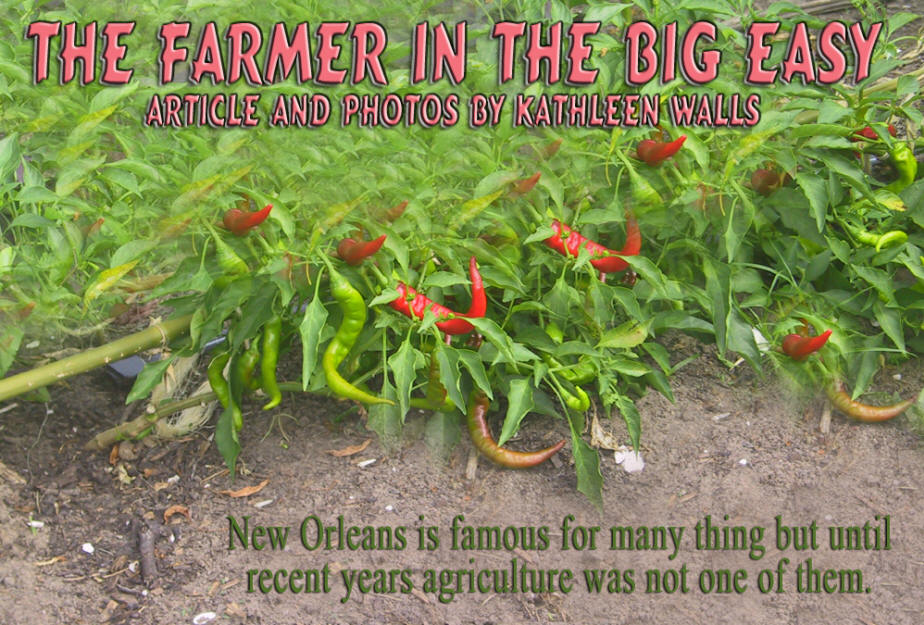
That is changing. Since Katrina,
community gardens have become a part of the Big Easy. Food has
always been an important part of New Orleans culture but a
disaster like Katrina reminded people how fragile the link that
connects us with the far away markets. I recalled the scene in
"Gone With the Wind" where Scarlett returns home to the ruined
fields of Tata and grubs in the garden to find a few tough
greens that survived the devastation. She pulls up a handful and
holds them to heaven and cries "As God is my witness, they're
not going to lick me. I'm going to live through this and when
it's all over, I'll never be hungry again."
With plentiful produce close and
available in case of any emergency, no one needs to be hungry
again.
 |
| Ninth Ward Community Garden |
While In New Orleans, I visited just a few of the urban gardens.
Although all serve a common purpose, each is different.
When Katrina struck, the
hardest hit area was the old Ninth Ward. I lived in the Ninth
Ward for a good part of my teen years and it will always be
special to me. So it thrills me to see a group like
The Ninth Ward
Community Garden take root and
teach residents good
gardening techniques such as testing soil and avoiding harmful
chemicals on food. Residents who may never have visited a "real"
farm now are learning to harvest and preserve food they help
grow right on Desire Street in what was (and is) as urban an
area as ever existed. The garden, started in 2010, is an oasis
where neighbors not only grow food but strengthen friendship and
have a green place to relax amid busy streets and shotgun houses
on small lots. Ninth Ward Community Garden is a member of NOLA
Green Roots which serves as a hub where small local gardeners
can come together and learn.
 |
| A worker in the fields at
Vintage Farms |
Traveling down through the lower Ninth Ward to Chalmette in St.
Bernard Parish, I found another community garden,
Vintage Garden Farm.
Actually they have three farms in the New Orleans area. besides
the Chalmette farm, the Uptown and Metairie Arc centers also
include farms The farms have a multipurpose. Besides
providing a source of local organic type produce they provide
jobs for those with an intellectual disability or delay.
Site Manager Josh Raser Explained that
the property was owned by the Catholic Church and was the site
of Prince of Peace Church which was severely damaged by Katrina. Arc, an
organization that helps people with intellectual disabilities or
delays, leased
the land from the Archdiocese and began the farm to provide jobs
for those with disabilities as well as a local source of safe,
reasonable priced produce. They now use the church as a
community center.
 |
| Shelton, one of Vintage Farm's
workers, is justly proud of his red peppers |
Josh described the farm, "We have about five
acres with three in production. We're not certified organic but
we don't use pesticides."
He showed me a section of a field with winter rye planted on it
and explained that the farm grows a crop for one year on a plot
then lets it set fallow for a year with a cover corp. Another
thing they use are "good bugs" such as ladybugs to help
eliminate the pests. They plant rows of different crops
staggered rather than all of one crop together.
According to
Josh, "The idea is different plants attract different kind of
bugs. On
mono-culture farms, they have acres upon acres of whatever. If
the bug attacks one crop it will spread all over. Here, let's
say it goes to the row of okra then it goes to the next row it
finds eggplant and so on."
Crops range from banana and citrus trees
to ginger, turmeric and other herbs to normal garden crops such
as squash, peppers, melons, eggplant, okra, beans and others.
They try some different vanities such as a red okra which is
popular since it looks so different but turns green when cooked.
They try to keep trees in the parking lot so it provides shade
for some plants that require it as well as a pleasant place to
visit.
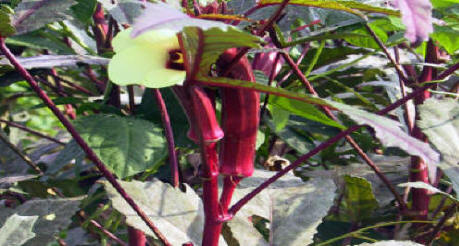 |
| Heritage red okra grown at
Vintage Gatdens & Grow Dat Youth Farm |
He showed me the compost area which he described as "the
lifeblood of an organic farm."
They also use fish emulsion which smelled pretty strong
but according to Josh is "like steroids for plants in the
garden."
As we toured the farm, several workers
were busy harvesting some peppers. One of the workers, Shelton,
brought over a basket of peppers he had picked. They were
beautiful, red and shiny.
Visitors can come to the farm on Monday
or Tuesday morning while the workers are in the garden and buy
their produce or they can buy it at Crescent City Farmers Market
or Mid-City Market on Thursdays. They also sell to some
restaurants which are good markets especially for the herbs.
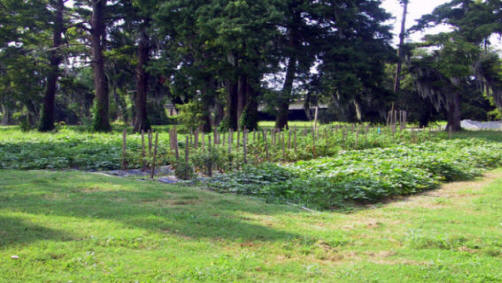 |
| Part of the gardens at Grow Dat
Youth Farm |
Grow Dat Youth Farm
is another farm in New Orleans with a dual concept. Sara Howard.
the farm manager, showed me around the 7.1 acre eco-campus site
located in City Park. It
was founded in 2010 by Johanna Gilligan and located in City Park
since spring 2011. Sara explained. "Our mission is to foster
leadership in diverse group of young people. We hire high school
students to participate in our spring and summer leadership
program and once they graduate they are eligible to apply for
positions as junior staff and come back and lead their peers and
work on the farm. We structure the curriculum around four
pillars: sustainable agricultural which comprises half or the
time; leadership development and workforce readiness; healthy
nutrition and lastly food justice which comprises food safety,
migrant workers conditions
and how food gets from the farm to their plates."
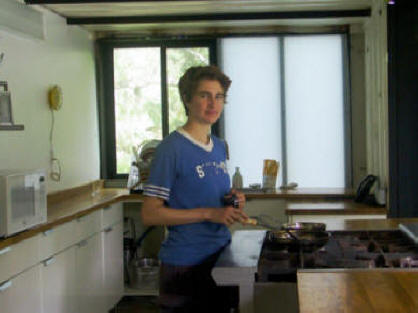 |
| Sara Howard displays Grow Dat
Youth Farm's test kitchen |
They have about two acres in productions and sell to local
restaurants and two farmers' market. They produce peaches,
bananas, citrus and divertive garden farm crops.
Sara said, "We use sustainable methods
such as crop rotation, cover crops and using beneficial insects
and use no chemical pesticides or fertilizers. We are totally
organic although not government certified."
They have a testing kitchen
on site where they can
sample healthy recipes using the crops they produce and
a small "Mobile Market"
they use to showcase the produce when they are selling it.
Talk about a win_win situation!
 |
| Part of Hollygrove's garden |
Hollygrove Market and
Farm is a different concept.
It is a combination of farm and store.
The farm section is
a non-profit corporation owned by Hollygrove Community in
Jefferson Parish. The
market is a separate entity.
Rie Ma, Communications & Community
Outreach Specialist, for Hollygrove showed me around.
Hollygrove was started about six years
ago. Organic is less a issue for them than local sustainability.
They do not use any synthetic chemicals or fertilizers. They may
use some fertilizer but no pesticides. "All are natural," Rie
said. "We follow the organic procedures but are not organically
certified."
The store itself is filled with not only
produce but other healthy foods such as grass fed beef and local
honey. Ria told me that there are three mentor farmers who
assist them and they take on interns who want to learn stainable
practices to work with the farming.
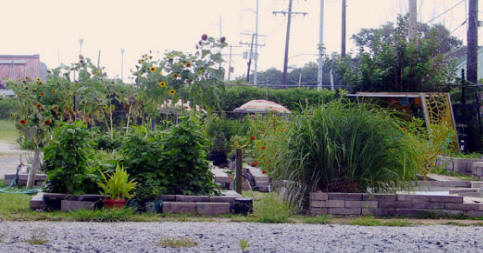 |
| The
community gardens patches at Hollygrove |
They grow some produce that they sell in the market and purchase
other items from local farmers and growers. In addition to the
produce the market grows there are community beds for
individuals. These are small
raised beds which are planted and tended by individuals. A
member may grow whatever produce they want. Their only
responsibility is to keep it looking nice and maintain healthy
growing practices.
Originally the beds were owned by only
people who live in the surrounding Hollygrove Community but now
some are owned by others who frequent the store. If you are
considering getting your own plot be aware they have a long
waiting list.
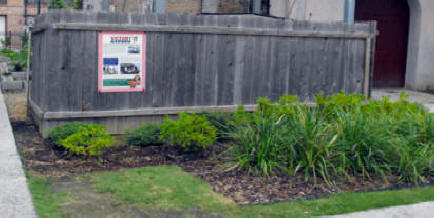 |
| Victory Garden at WWII Musuem |
A visit to another New Orleans attraction, the World War II
Museum,
(Click here for more about the World War II Musuem) reminded
me that local gardens are not a totally new concept. One of the
outside exhibits is a small "Victory Garden."
Victory gardens were begun during World
War I and were an important source of food production during
both World War I and II. President Woodrow Wilson said "Food
will win the war."
Perhaps all communities should take a
lesson from New Orleans gardening endeavors and realize how
important it is to have a local source of food.
For more info:
http://ninthwardcommunitygarden.com/site/
http://blog.nola.com/stbernard/2012/06/chalmette_arc_workers_employed.html
http://growdatyouthfarm.org/
http://hollygrovemarket.com/
http://www.nationalww2museum.org/learn/education/for-students/ww2-history/at-a-glance/victory-gardens.html
|